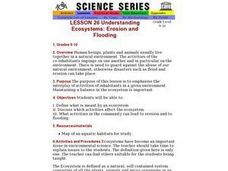Curated OER
The Path of Pollution
Students conduct a brainstorming exercise that asks them to list all the ideas about air pollution that can be recalled. The ideas are recorded on a chart that the teacher has prepared. The lesson contains sufficient background...
Curated OER
The Very Clumsy Click Beetle
Second graders determine what it means to be clumsy before listening to Eric Carle's, The Very Clumsy Click Beetle. They examine the part where the click beetle does flips before drawing three frames that show the beetle flipping. For...
Curated OER
The Very Hungry Caterpillar
Second graders watch a video about Eric Carle before listening to his story entitled, The Very Hungry Caterpillar. They notice how the caterpillar eats its way through the days of the week and they examine the life cycle of the...
Curated OER
Global Symposium
Ninth graders work together to develop a sysnopis on the Earth. Using the Internet and print sources, they focus on one country to research and determine its condition. They offer possible solutions to the problem and share their...
Curated OER
Life in Extreme Environments - Lakes Under Ice
Students collect chemical, physical, and biological data from a local lake throughout the year. In addition, students discuss the design of an experimental structure for water collection at several specific depths as well as assess the...
Curated OER
Worm Composting: Vermiculture
Students compost in a limited space and describe the decomposing process. Students convert unwanted, organic matter, particularly food scraps and paper into fertile soil.
Curated OER
Oily Oceans
Students, after reading Jack, the Seal and the Sea, by Gerald Aschenbrenner, get a hands-on knowledge of the effects of oil on water, and those things that come in contact with it.
Curated OER
Hopskotch Migration
Students understand the use of the wetlands by migrating birds and identify causes for disappearance of the wetlands.
Curated OER
Household Hazardous Waste Identification
Fourth graders learn about reduce, reuse, and recycle and identify household hazardous products. Students learn about less hazardous alternatives and complete an inventory of hazardous materials in a typical household.
Curated OER
Desert Xeriscaping
Seventh graders identify native species of desert vegetation, plan a xeriscape landscape, and recognize the importance of water conservation.
Curated OER
Storm Drain Dumping
Students develop an awareness of what happens to water contaminated through neighborhood runoffs. Students perform an experiment that shows what happens to runoff when it's diverted to different places.
Curated OER
Acid Rain Keeps Falling On My Head
Students measure the pH of local rain water. Students map the location of the collected rain water according to pH levels.
Curated OER
Aquifers: Unlimited or Not
Pupils understand that an aquifer can become a non-renewable resource if it is not used wisely. Students do an experiment that recreates an aquifer in the classroom.
Curated OER
School Ground Naturalization Project
Students determine the best location for a potential naturalized project for a school ground.
Curated OER
Understanding Ecosystems: Erosion and Flooding
Learners study the balance in the environment needed for ecosystems. They discuss what can lead to erosion and flooding.
Curated OER
"Honey Dew from Bunny Too!"
The pupils will design a lab to test the mechanism that triggers spore dispersal. They should have some clues after making observations of the life cycle. Part of the fun here is to let the students devise a method for testing this...
Curated OER
Oceanography Research
Fifth graders locate information on a specific ocean animal using encyclopedias, nonfiction books, SIRS Discoverer, multimedia encyclopedias, and the Internet. They create an acrostic poem about the ocean animal they have been researching.
Curated OER
Trash Pizza
Pupils identify items commonly sent to landfills and summarize percentages/fractions of different items in landfills Students create a pizza pie graph of landfill components
Curated OER
Water Conservation Task
Students list reasons that water conservation is important. They describe methods to conserve water. This lesson could be incorporated with an oral hygiene lesson on brushing teeth.
Curated OER
Air Pollution Survey
Students identify the different sources of air pollution andevaluate knowledge of air pollution concepts in school and community. Students brainstorm ways of reducing air pollution and instruct school and community in reduction of air...
Curated OER
Texas Estuary Project
Learners practice the proper lab techniques of coring, seining, taking temperatures, and salinity. Students analyze and graph data. Learners write a 3 part essay and correctly draw and label a food web of their field site.
Curated OER
Ecology
Students learn what the Kyoto Protocol is and examine the decision of the United States to not sign the agreement.
Curated OER
Wolf Lesson Plan
Students research the reintroduction of wolves into Yellowstone National Park. They present their research in a role-playing format.
Curated OER
The Arctic and Taiga Ecozone of Canada
Young scholars discover the differences in the Arctic and Taiga regions of Canada. They identify physical and human characteristics of both region. They also practice using an atlas.
Other popular searches
- Environmental Science Games
- Environmental Science Unit
- Ap Environmental Science
- Environmental Science Energy
- Environmental Science Maps
- Environmental Science Debate
- Environmental Science Water
- What Is Environmental Science
- Environmental Science Projects
- Environmental Science Graphing
- Life and Environmental Science
- Environmental Science Rift

























